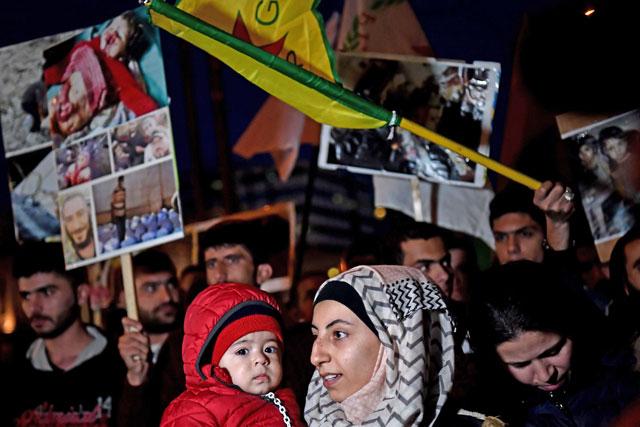You are here
Turkey warns Syrian army against helping Kurdish YPG in Afrin
By Thomson Reuters Foundation - Feb 19,2018 - Last updated at Feb 19,2018
BEIRUT/ANKARA — Turkey warned on Monday it would confront Syrian government forces if they entered Syria's northwestern Afrin region to help the Kurdish YPG militia repel a Turkish offensive.
Turkey began its Afrin operation with allied Syrian rebels last month against the YPG, which Ankara regards as a threat to its border and terrorist group linked to the Kurdish PKK insurgency at home.
Ankara's onslaught has further scrambled the matrix of rivalries and alliances in northern Syria among Kurdish forces, the Syrian government, rebel factions, Turkey, Iran, the United States and Russia.
Monday's comments by Turkey's president and foreign minister came after a Kurdish official said a deal had been struck for the Syrian army to go into Afrin soon to help against the month-old assault.
YPG officials did not respond to requests for comment.
Syrian state media said on Monday that pro-government militia would enter Afrin "within hours" but by sunset there were no signs of a deployment there.
"If [the Syrian army] comes in to defend the YPG, then nothing and nobody can stop Turkish soldiers," Turkish Foreign Minister Mevlut Cavusoglu said in Jordan. He added that Turkey would have no issue with Syrian troops entering Afrin if they did so to "cleanse" it of the Kurdish fighters.
Turkish President Recep Tayyip Erdogan later said in a phone call with Russia's President Vladimir Putin that Damascus would face consequences if it struck a deal with the YPG and said the Afrin operation would continue, CNN Turk reported.
There was no immediate comment from the Syrian military, or from Moscow on the reported Afrin deal.
Erdogan also spoke to Iranian President Hassan Rouhani about developments in Syria's Idlib and Afrin, a Turkish source said.
On Sunday, Badran Jia Kurd, an adviser to the Kurdish-led autonomous administration in northern Syria, said there was a military understanding between Damascus and Kurdish forces for the Syrian army to enter Afrin. But he added that it faced opposition which could derail it.
Another Syrian Kurdish political official said on Monday that pressure from Russia, the biggest ally of Syrian President Bashar Assad, had prevented the deal from going ahead so far.
Deals between the Syrian government and the Kurds, which each hold more territory than any other side in Syria, could prove pivotal for the future course of the war.
Complex relationships
Since the onset of Syria's conflict in 2011, the YPG and its allies have set up three autonomous cantons in the north, including Afrin bordering Turkey. Their sphere of influence expanded as they seized territory from Daesh militants with US help, though Washington opposes their political ambitions as does the Syrian government.
While Assad's government and the YPG espouse different visions for Syria's future and their forces have clashed at times, they have mostly avoided direct conflict.
Jia Kurd told Reuters on Sunday that Syrian army troops would deploy along some border positions under the deal between the Kurds and the government.
"Popular forces will arrive in Afrin in the next few hours to support the steadfastness of its people in confronting the aggression," Syrian state news agency SANA reported, citing its correspondent in Aleppo, 35km from Afrin.
Jia Kurd said the deal was only on military aspects, and any political or other agreements would have to wait for further negotiations between Damascus and the Kurdish administration.
The PKK, a leftist Kurdish movement that has mounted a three-decade insurgency in Turkey, is considered a terrorist organisation by Turkey, the United States and Europe. Ankara also regards the YPG as indistinguishable from the PKK, though the groups each say they are independent organisations.
The Afrin offensive has strained the complex ties between the warring sides in northern Syria and their external supporters.
Turkey's NATO ally the United States has armed the YPG as part of an alliance it backs in Syria against Daesh, which has infuriated Ankara.
But while Washington has a military presence in the much larger swathes of Syria that the YPG and its allies control further east, it has not given support to the YPG in Afrin.
Related Articles
ANKARA/BEIRUT — Pro-Syrian government forces entered Syria's northwestern Afrin region on Tuesday to help a Kurdish militia there fend off a
ANKARA/BEIRUT — The Turkish army on Monday took control of the outer edge of Syria's Afrin region, state media said, as Ankara said it was r
QAMISHLI — Donning vibrant traditional dress, thousands of Kurds in Syria's Qamishli turned their new year celebration of Nowruz on Wednesda

















